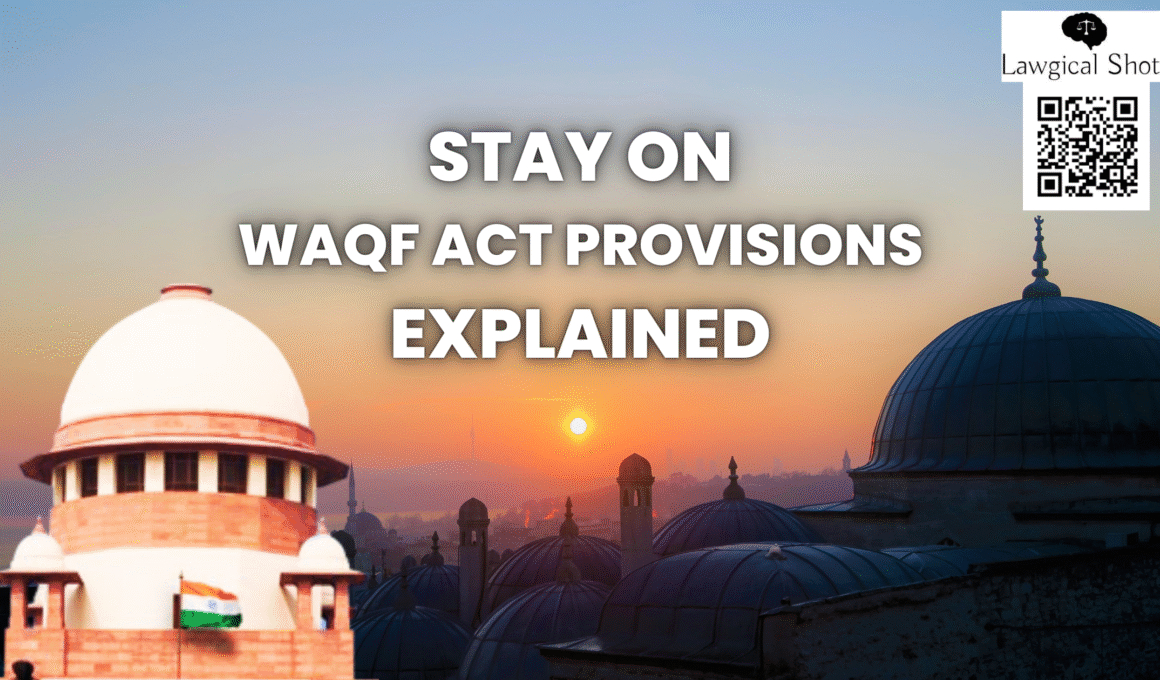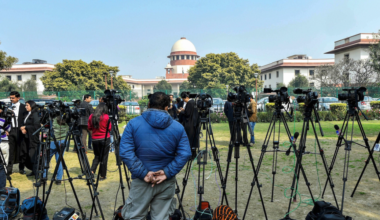What Happened to WAQF Law in India?
Recently, the WAQF law had been in limelight for quite some time. The major reason was the government codifying, analysing, and modifying certain provisions related to WAQF property. The WAQF Act, 2025 was amended by the government and caught in headlines since then. Several provisions of the WAQF (Amendment) Act, 2025 have been challenged before the Supreme Court of India for allegedly being ultra vires of the Constitution. The specific violations of Articles 14, 15, 19, 21, 25, 26, 29, 30 and 300A of the Constitution have been alleged.
Issues Considered before Interim Stay on Waqf Act Provisions
The following three issues were identified for consideration by the Court at the interim stage:
- Challenge to provision which de-recognized ‘Waqf by user’ prospectively;
- Challenge to special provision for Government Properties under Section 3C; and
- Changes to the composition of Central Waqf Council and State Waqf Board under Section 9 and 14.
The said issues were finalised previously under the Bench of former CJI Sanjiv Khanna. However, it was finally decided to take up several additional issues proposed by the petitioners while deciding the scope for interim stay on Waqf Act.
Court’s Reasoning for Stay on Waqf Act Provisions
Scope for Interim Relief
The Supreme Court acknowledged the settled legal principle of Courts being wary of staying enacted provisions, while extending interim relief. The Court referred to several landmark judgments including Charanjit Lal Chowdhury v. Union of India (1950), State of Bombay v. F.N. Balsara (1951), Shri Ram Krishna Dalmia v. Shri Justice S.R. Tendolkar (1959), and several others.
A look at Waqf Enactments
The Court began with scanning the historical enactments governing and regulating Waqf property.
Mussalman Wakf Act, 1923
This was the first enactment to deal with the menace of mismanagement of wakf properties, as reflected in the statement of objects. It was highlighted that Waqf endowment had become a clever device to tie a property for the purpose of defeating creditors and evade the law. The 1923, as noted by the Apex Court, made an obligation to furnish Waqf particulars, their publication, requisition, statement of accounts, audit and verification of accounts, even including penalty for non-compliance.
Bengal Wakf Act, 1934
The star provision of this enactment was the recognition of ‘’Wakf by User’, which is the subject of discussion in the instant matter of the recent Waqf Amendment Act 2025.
Wakf Act, 1954
This one was independent India’s enactment. This one as well recognized Waqf by User. It required the State Government to appoint Commissioner of Wakfs for conducting inquiry and submission of report regarding existing Wakfs. The State govt. Also had to direct the Commissioner to make second or subsequent survey of wakf properties, to forward a receipt of Report to the Board. The Board in turn would examine and publish the said report in official gazette. Disputes regarding Wakfs are to be determined by a civil court. The Court looked at specific provisions for registration of Waqf at Commissioner Office, detailed application process, inquiry, register of wakfs, Waqf Board powers, concept of Mutawalli, penalties for non-compliance by Mutawalli.
Wakf Enquiry Committee & Wakf (Amendment) Act, 1984
The Court hereunder highlighted the observations of Wakf Enquiry Committee which submitted its report in 1974 pertaining to several properties not being registered as Waqf properties. Major part of recommendations to introduce imprisonment as a punitive measure for non-compliance. The amendment in 1984 sought to insert a specific provisions in furtherance of recommendations of this Committee, which was never effected.
The Court noted that several amendments have been made from time to time to remove deficiencies in the original 1954 Act. Even the 1984 amendment was strongly opposed to by the Muslim community. Accordingly, a near consensus amendment was introduced to the provisions of 1984 which led to enactment of 1995 Act.
Waqf Act 1995
This Act sought to deal with the misuse of waqf properties either with or without the connivance of the Mutawallis. The Act made sure that the alienation of Wakf properties would not be easy. The Court looked at the several essentials and particulars of the provisions of the 1995 Act.
Provisions of Impugned Act
Analysing for presumption favouring constitutionality, placing the burden upon the attacker to prove clear transgression of constitutional principles, the Court proceeded. The Court also discussed the legislature’s power to legislate. Given below are the provision specific challenges and what the Apex Court decided:
- The impugned amendment limited the waqf to be created by a person practising Islam for at least 5 years, which is alleged to be arbitrary and discriminatory. However, the Court did not feel so. The Court was wary of misuse of waqf as feared in previous enactments, and in the absence of rules to determine 5 years of practising Islam, the Court held that it could not be effected as of now.
- The next challenge pertains to provision requiring waqf property as one owned by person dedicating it. Since a charity cannot be done for property or money owned by someone else, the Court held that it could not be said arbitrary.
- On deletion of clause related to ‘waqf by user’, the Court commented that if the Mutawallis chose not to apply for registration for 30 years, they cannot be heard to say the provision requiring application accompanied by a copy of waqf deed as arbitrary. The Court observed in favour of the government that if they find huge number of government properties encroached, they can take steps to delete ‘waqf by user’ provision prospectively and it cannot prima facie be said to be arbitrary.
- Regarding wrongful identification or declaration as waqf property, the Court assured that the government property is a property of citizens. However, the Court further added that “If a property is already identified as a waqf property or is declared as waqf property, then without determination of the question as to whether such a property is a Government property or not and treating the said property not as a waqf property, in our prima facie view, is arbitrary.”
- Subject to determining the title of a property being entrusted to the revenue officer, the Court expressed that it would not be in tune with the principle of separation of powers enshrined in Constitution. Such a question, as opined by the Court, will have to be resolved by a judicial or quasi judicial authority. As per the Court, the revenue officer cannot be entrusted to determine the title of property. The Court thereby ordered stay on Waqf Act provision in this regard.
- On validity of declaration of protected monument or protected area as waqf as void, the Court highlighted the Ancient Monuments Preservation Act, 1904 and the Ancient Monuments and the Archaeological Sites and Remains Act, 1958. Such monuments being vital to cultural heritage of our country, the Court looked at the ASI appearance before JPC complaining that the Mutawallis were not permitting them to take steps for protection and preservation of those monuments. Denying the allegations that such being protected areas would be a barrier for people to continue their customary religious practices, the Court did find a case to stay the said provision.
- On provision for bar on declaration of any land in Scheduled or Tribal area as Waqf, the Court discussed the marginalized and vulnerable sections of the society upon whom the 5th and 6th Schedules are applicable. Protection of their rights has been time and again upheld by the Court. The Court refused to stay on Waqf Act provisions seeking protection of the marginalized.
- Pertaining to establishment and constitution of Central Waqf Council and composition of Board, it was alleged that there will be non-Muslim members in majority. With a mention of Solicitor General’s submission, the Court issued a direction that non-Muslim members shall not exceed 4 in the Council and 3 in the Board.
- Looking at the provision for Appointment of CEO, term of office and service conditions, it was alleged that a non-Muslim could also be appointed, which would be a permit to directly interfere with religious affairs of minority community. The Court did not uphold the said contention and refused to stay, but opined to endeavour for appointing a CEO belonging to Muslim community.
- Since registration of Waqf property was under challenge, the Court found the requirement already prevailing. The Court held registration of Waqf on a par with trusts. Thus, the Court refused to put stay on Waqf Act provision for registration of Waqf property.
- The 2025 Amendment Act sought deletion of provision for Application of Act to properties given or donated by persons not professing Islam for support of certain waqf. The Court found the petitioner arguments contradictory since they claimed the concept of waqf to be Islam specific, but allowed donation of property from anyone regardless of their religion. Thus, the Court did not find the deletion to be rabitrary.
- Earlier, provisions of Limitation Act were not applicable to waqf matters. However, the Court found challenge against such change of limitation not arbitrary but one that ceases discrimination that prevailed in the previous Act.
- The 2025 Amendment deleted special provision for evacuee waqf properties. The provision was inserted during subsistence of Administration of Evacuee Property Act, 1950. Since the same was now repealed, the Court found the said provision redundant.








